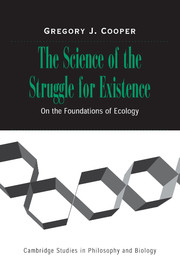Book contents
- Frontmatter
- Contents
- Introduction
- Acknowledgments
- 1 The Struggle for Existence
- 2 The Roots of Controversy
- 3 Must There Be a Balance of Nature?
- 4 The Pursuit of Ecological Generality
- 5 Model Building: A Controversial Craft
- 6 Theoretical Explanation and Fundamental Laws
- 7 The Explanatory Continuum
- 8 Theories, Models, and Explanatory Tools
- Epilogue
- References
- Index
2 - The Roots of Controversy
Published online by Cambridge University Press: 05 May 2010
- Frontmatter
- Contents
- Introduction
- Acknowledgments
- 1 The Struggle for Existence
- 2 The Roots of Controversy
- 3 Must There Be a Balance of Nature?
- 4 The Pursuit of Ecological Generality
- 5 Model Building: A Controversial Craft
- 6 Theoretical Explanation and Fundamental Laws
- 7 The Explanatory Continuum
- 8 Theories, Models, and Explanatory Tools
- Epilogue
- References
- Index
Summary
INTRODUCTION
The previous chapter outlined four basic objections to the definition of ecology as the science of the struggle for existence. Not surprisingly, these four objections correspond to four enduring foundational issues in the practice of the discipline itself. The goal of the present chapter is to deepen the analysis and to gain a clearer picture of what is at stake with each of these issues while, at the same time, substantiating the claim that each of these four areas has indeed been a significant locus for ecological controversy. The strategy is to look ultimately at some of the ways these foundational controversies have been manifest in the history of ecology, and I do this in two ways: first, by outlining the historical development of the various intellectual traditions that collectively comprise the field of ecology (section 2.3), and second, by exploring a series of eruptions of foundational debate that Robert May has dubbed ecology's twelve-year cycle (section 2.4). Before embarking on the historical study, some time is devoted to clarifying the philosophical framework for the investigations; attention is devoted, in particular, to the concept of a scientific field. This is the task of section 2.2.
FROM THEORIES TO FIELDS
For most of its early history, philosophy of science has been preoccupied with the scientific theory as the unit of scientific structure most germane to philosophical analysis. The interesting questions all seemed to involve theory in one form or another. What is the structure of a scientific theory?
- Type
- Chapter
- Information
- The Science of the Struggle for ExistenceOn the Foundations of Ecology, pp. 27 - 74Publisher: Cambridge University PressPrint publication year: 2003

